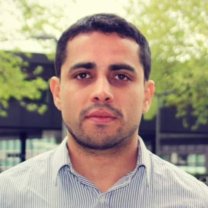Meet Camilo Benitez, Coordinator of the 4TU.RE Academy
Pleased to meet you Camilo, could you tell us a bit about yourself?
CB: Sure! I’m Camilo Benitez Avila and originally from Colombia. I am a postdoc of the group of Ethics and Philosophy of Technology, researching how one could situate responsibility in specific organizational agreements shaping urban social resilience.
My background includes Political Science by training, an MSc in System Dynamics, and a PhD in Public-Private Partnerships Governance (Construction Management and Engineering - Twente University). Additionally, I have applied research experience in Water Adaptation at Deltares and the Global Centre on Adaptation.
Recently I presented my research at the DeSIRE Conference 2022, where I talked about Resilience and so-called social chronic stresses.
You have been involved with the 4TU.RE community for some time now. How did you get involved with the 4TU.RE Academy?
CB: I took over from Carissa Champlin earlier this year. The fact that there was already a community dedicated to the 4TU.RE Academy made it attractive for me to step up for the coordination task. I noticed that the team is really committed and delivers high quality work, something that SURF recognizes too!
What was the first thing that you took on?
CB: Well, with the help of the Academy Advisory Board, I conducted a survey to look into the match between the materials that we offer on the Open Educational Resources platform and what users need and expect, plus overall usability. I presented the results to the Strategic Board and we decided to put our efforts into improving the match between users’ needs and the materials that the platform provides. I would like to find a balance between ‘supply’, suppling the materials and ‘demand’, the usability experience. Also, I continue to work with the recommendations that Carissa handed over to me.
What I like to do in my role as coordinator is to analyse the situation and to make informed improvements. To focus my efforts, I look at different levels: the overall level of our ambitions with the Resilience Engineering community, as well as the more pragmatic level of how to manage the platform. Apart from the nitty-gritty details of the materials themselves, I also pay attention to the overall visibility of the 4TU.RE Academy with the aim of maintaining and involved and committed community.
What’s next for the 4TU.RE Academy?
CB: I have applied with other colleagues for the Open Education Stimulation Fund 2022 at TU Delft and hope to receive funding for a project which we called: “Cooking up Open Education Resources for the Resilience Engineering Community”.
This project addresses the bottleneck I’ve found in the ‘demand’ side of using the Open Educational Resources platform. I think that the main barrier educators face is the unexpected additional time and effort to find the right resources and adapt the material to their needs, all the while there is an immense potential for open educational materials to contribute to curricula and assisting educators with proven materials. Also, I would like to address the ‘supply’ bottleneck, that I see at the same time: Contributors actually receive few institutional incentives for making materials more user-friendly.
I propose to introduce "Cooking up OER" as innovative open education practice. "Cooking up OER" is a 5 min instructional video produced by an educator that has already engaged in producing and re-using an OER, where they explain how a specific material was produced (and how it is intended to be re-used by other educators). We do not cook alone. “Cooking up OER” brings together our existing community and welcomes others to share, reflect and learn. Together we will exchange knowledge on the steps of creation, selecting content, translating existing material into an OER, and tips and tricks for making an appealing OER.
Thank you Camilo for sharing your vision and best of luck with your endeavours in 2023!




